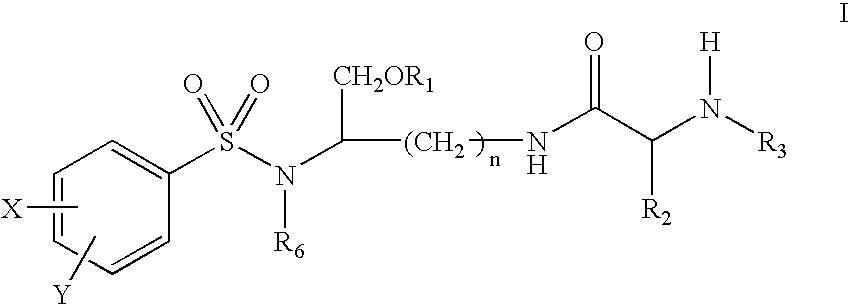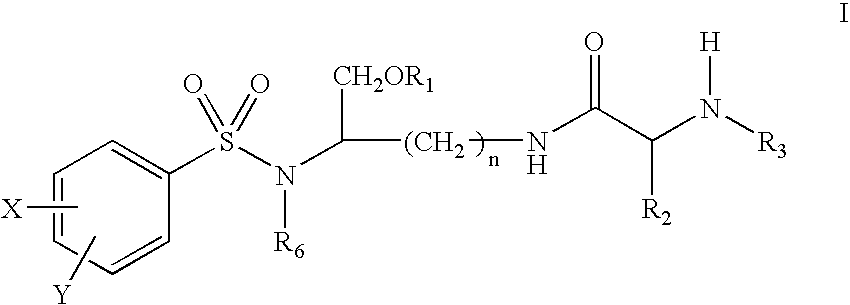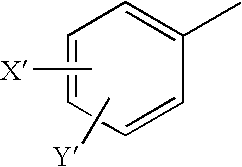Lysine based compounds
a technology of lysine and compound, applied in the field of lysine based compounds, can solve the problems of low bioavailability, high pill burden, inadequate treatment, etc., and achieve the effects of increasing solubility, improving bioavailability of active ingredients, and potent antiviral activity
- Summary
- Abstract
- Description
- Claims
- Application Information
AI Technical Summary
Benefits of technology
Problems solved by technology
Method used
Image
Examples
example 1
Preparation of (1S,5S)-(1-{5-[(4-amino-benzenesulfonyl)-isobutyl-amino]-6-phosphonooxy-hexylcarbamoyl}-2,2-diphenyl-ethyl)-carbamic acid methyl ester (PL-461)
[0179] The preparation of the title compound is based on schemes 1 and 2 of this invention.
Step A. Preparation of (3S)-3-isobutylamino-azepan-2-one (IV)
[0180] L-α-amino-,-caprolactam (22.0 g) was dissolved in cold dichloroethane (DCM, 200 mL). isobutyraldehyde (12.6 g) was added slowly and stirred until the heat evolved was dissipated (water forms at the surface). The cold solution was added to 46.5 g of powdered NaBH(OAc)3 in DCM (0.5 L). AcOH (70 mL) was added to the solution. The slightly turbid mixture was stirred at 20° C. for 4 h. A 500 mL solution of 2M NaOH was added slowly to the turbid mixture and the pH adjust to 11 using a concentrated NaOH solution, and then the mixture stirred for a further 20 min. After extraction, the DCM layer was dried with MgSO4, filtered and evaporated. The oil thus obtained crystallizes ...
example 2
Preparation of (1S,5S)-(1-{5-[(4-amino-benzenesulfonyl)-isobutyl-amino]-6-phosphonooxy-hexylcarbamoyl}-2,2-diphenyl-ethyl)-carbamic acid methyl ester sodium salt (PL-462)
[0203] 70.7 mg of the final product of example 1 is added to 1 mL 0.1 N NaOH and diluted with 1 mL of distilled water. The Solution is then frozen and lyophilized. Yields 67.2 mg (92%) of the desired material with 95% purity.
[0204]1H NMR (CD3OD): δ 0.72-0.83 (m, 1H), 0.90 (d, J=5.8, 9H), 1.26-1.38 (m, 1H), 1.53-1.65 (m, 1H), 1.88-2.00 (m, 1H), 2.60-2.70 (m, 1H), 2.79-2.89 (m, 1H), 2.98-3.00-3.08 (m, 1H), 3.54 (s, 3H), 3.58-3.71 (m, 1H), 3.72-3.83 (m, 1H), 3.84-3.95 (m, 1H), 4.28 (d, J=11.1, 1H), 4.91 (d, J=11.0, 1H), 6.70 (d, J=7.6, 2H), 7.12-7.22 (m, 2H), 7.22-7.32 (m, 6H), 7.33-7.40 (m, 2H), 7.50 (d, J=7.7, 2H).
[0205]31P NMR (CD3OD): δ 3.13
example 3
Preparation of (1S,5S)-(1-{5-[(4-amino-benzenesulfonyl)-isobutyl-amino]-6-phosphonooxy-hexylcarbamoyl}-2-naphthalen-2-yl-ethyl)-carbamic acid methyl ester (PL-507)
[0206] The preparation of the title compound is based on scheme 2 of this invention.
Step A. Preparation of (1S)-(4-{[5-tert-butoxycarbonylamino-1-(diethoxyphosphoryloxymethyl)-pentyl]-isobutyl-sulfamoyl}-phenyl)-carbamic acid tert-butyl ester (VIII)
[0207] 2.00 g (3.7 mmol) (1S)-{4-[(5-tert-butoxycarbonylamino-1-hydroxymethyl-pentyl)-isobutyl-sulfamoyl]-phenyl}-carbamic acid tert-butyl ester (VII) (example 1, step D) is dissolved in 0.63 mL triethylphosphate and 10 mL THF at 0° C. under inert argon atmosphere. 0.63 mL (4.44 mmol) diethylchlorophosphate is added and then 0.25 g (6.2 mmol), NaH 60% in oil is added in portionwise. The mixture is allowed to warm to room temperature and left to stir for 2 h (LC-MS showed completion after 1 h). To the solution is added 2 0 mL of Amberlite XAD-2 resin and the slurry thoroughly ...
PUM
 Login to View More
Login to View More Abstract
Description
Claims
Application Information
 Login to View More
Login to View More - R&D
- Intellectual Property
- Life Sciences
- Materials
- Tech Scout
- Unparalleled Data Quality
- Higher Quality Content
- 60% Fewer Hallucinations
Browse by: Latest US Patents, China's latest patents, Technical Efficacy Thesaurus, Application Domain, Technology Topic, Popular Technical Reports.
© 2025 PatSnap. All rights reserved.Legal|Privacy policy|Modern Slavery Act Transparency Statement|Sitemap|About US| Contact US: help@patsnap.com



